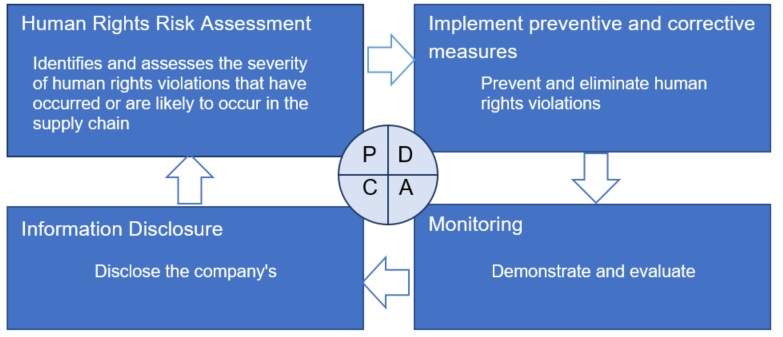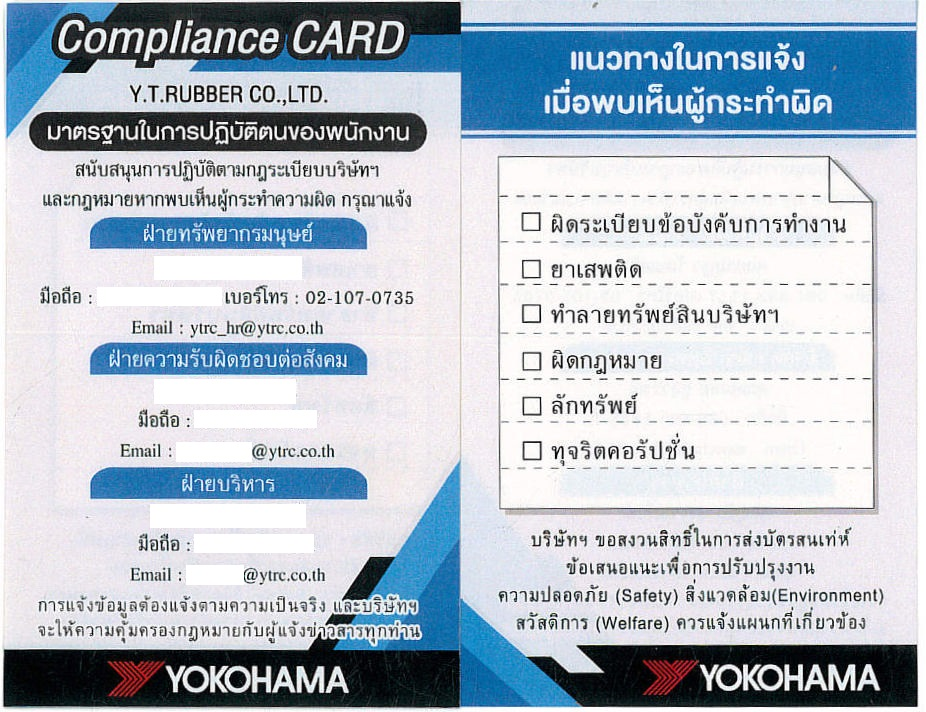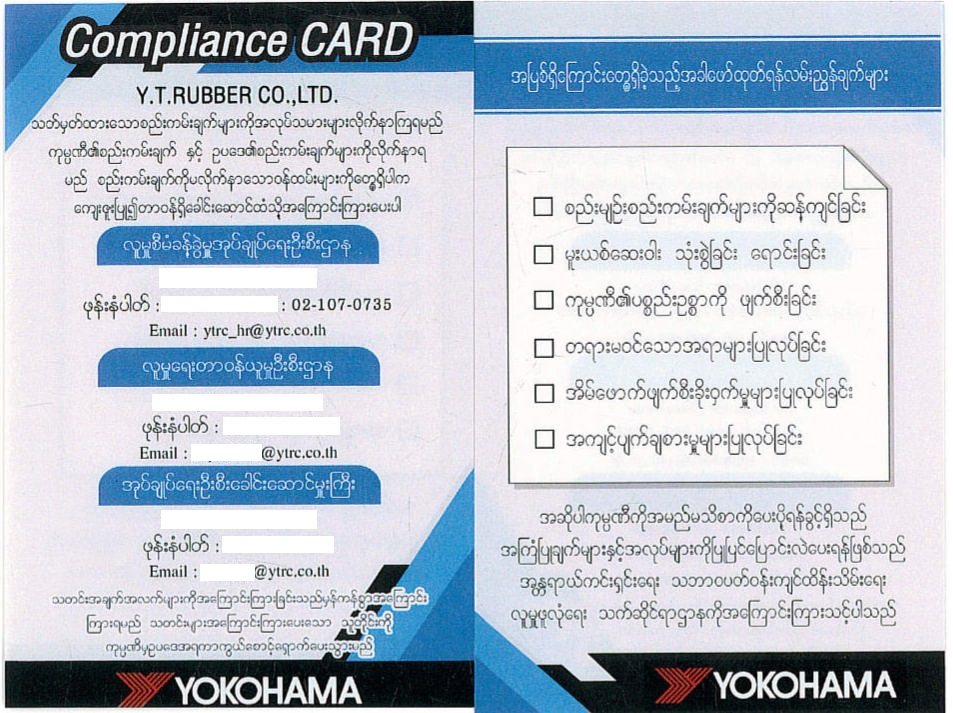Human Rights
Management
Our position
Human rights are fundamental rights afforded to all people. Looking back into the stage of procurement of raw materials, we realize the Yokohama Rubber Group’s business involves a very large number of people through its supply chain, and that there is a wide range of human rights that must be respected. In addition, with the globalization of our business activities, our interactions with various people have increased, and the possibility of having a direct or indirect impact on human rights violations has also increased.
For this reason, we believe it is important to fulfill our responsibility to respect human rights while taking into consideration the scope of such impact. Accordingly, we have established the "Yokohama Rubber Group Action Guidelines" to indicate our internal and external efforts to respect human rights and to define the actions to be taken by our employees.
Furthermore, based on the United Nations Guiding Principles on Business and Human Rights*, we have formulated the "Yokohama Rubber Group Human Rights Policy", and are promoting initiatives aimed at respecting the human rights of all people involved in our business activities.
The Yokohama Rubber Group recognizes the importance of implementing Group-wide efforts to respect human rights as the basis of our business activities in order to contribute to the realization of a sustainable society as a company that is widely trusted by society.
- The Guiding Principles on Business and Human Rights were approved by the United Nations Human Rights Council in 2011 as a framework for respect for human rights applicable to all nations and all companies. The Guiding Principles position "the responsibility of companies to respect human rights" as an important pillar of this effort, along with "the obligation of states to protect human rights.
Policy
Yokohama Rubber Group Action Guidelines (Excerpt)
We shall respect human rights inside and outside the company
Yokohama Rubber Group Action Guidelines (established in December 2014)<Basic stance of the Yokohama Rubber Group>
We shall respect human rights, and shall not practice or be a party to discrimination or harassment.
<To put our basic stance into practice — our action>
- With an awareness of the diversity of the people working for us, we shall refrain from any action grounded in discrimination for reason of race, ethnicity, nationality, religion, sex, or other attributes. In addition, when we notice any such action, we shall resolutely point it out and urge its correction.
- We shall refrain from harassment in any shape or form.
- We shall not permit any violent behavior in the workplace.
The Yokohama Rubber Group Human Rights Policy
The Yokohama Rubber Group Human Rights Policy (established in April 2022)The Yokohama Rubber Group Human Rights Policy serves as the basis for all of the Group's business activities as its top human rights policy, based on the Corporate Philosophy and the Yokohama Rubber Group Action Guidelines.
Our Human Rights Policy applies to all officers and employees of the Yokohama Rubber Group (directors, auditors, executive officers, other persons associated with business execution in relation to management, and those in employment contracts with Yokohama Rubber Group companies, employees accepted on seconded and temporary employees). To ensure that our commitments to human rights can be realized in our business activities, we expect that all of our business partners including suppliers and distributors will also understand and support this policy.
CSR Procurement Guidelines
CSR Procurement GuidelinesThe CSR Procurement Guidelines have been revised in accordance with changes in social conditions and expansion of our activities. In October 2022, the guidelines were revised in line with the formulation of the Yokohama Rubber Group Human Rights Policy and other related policies in such a way as to reflect the human right policy that more strongly requests our suppliers to protect human rights and prohibit discrimination and harassment in the supply chain.
Sustainable Natural Rubber Procurement Policy
Sustainable Natural Rubber Procurement PolicyYokohama Rubber, setting policies on "respect for human rights," "fair and equal treatment," "harassment," "child labor," "forced labor," and "appropriate working conditions" in its Sustainable Natural Rubber Procurement Policy, has implemented efforts for the respect of human rights.
Message from a manager
Under the slogan of "Caring for the Future" in its sustainability management, the Yokohama Rubber Group will implement efforts for the respect of human rights as the basis of its business activities based on our "Corporate Philosophy.", "Yokohama Rubber Group Action Guidelines" and "Yokohama Rubber Group Human Rights Policy" in order to contribute to the realization of a sustainable society as a company that is widely trusted by society.
As one of our efforts, we join the Global Platform for Sustainable Natural Rubber (GPSNR), which was launched under the leadership of the Tire Industry Project (TIP) of the World Business Council for Sustainable Development (WBCSD), and we have been working on the procurement of natural rubber, which is fraught with various risks associated with human rights and labor issues, while addressing the establishment of traceability and the problems faced by local communities and farms, with the aim of ensuring the procurement of natural rubber.
By March 2023, we had visited and conducted interviews at 506 farms in the Surat Thani province in Thailand, where our natural rubber processing factory is located.
From now on, we will collaborate with a third party institution to make further reassessment about human rights issues and take necessary measures as necessary.
For procurement items other than natural rubber, we will more strongly request our suppliers to protect human rights and prohibit discrimination and harassment in the supply chain based on the CSR Procurement Guidelines.
The Yokohama Rubber Group will share these ideas throughout the supply chains involved, respect the human rights of all people involved in our business activities, and continue to make improvements.
Takashi Shirokawa, Head of CSR Division
Vision for FY 2023
- We will respect human rights both internally and externally, and respond sincerely to complaints concerning human rights and make improvements to ensure that there is no child labor or forced labor within the company and our suppliers.
- We will promote the introduction of a global whistle-blowing system to raise the level of compliance across the Group.
- We will sort out cases of problems that have taken place in the Group in the past, and organize a system so that employees can learn from these cases at important milestones in their careers, at the time of employee movement or promotion.
Priority measures
Human Rights Due Diligence

FY2022 initiatives
1 Assessments related to employees working at the Shimbashi head office
Targets: Yokohama Rubber Group employees working at the Shimbashi head office
Main human rights issues: "Discrimination," "harassment" and "occupational health and safety"
The following issues were identified during the FY2022 inspection. Going forward, we will rectify and respond to these issues.
- Human rights education: Insufficient awareness of the Human Rights Policy.
- Occupational health and safety: Insufficient efforts to collect feedback from employees through workplace environment surveys, and other means.
- Complaint management mechanisms: Although complaints received at consultation services are handled appropriately, the efficacy of these services has not been sufficiently verified.
2 Assessments related to workers at a natural rubber plantation in Thailand
Targets: People working at a natural rubber plantation in Surat Thani Province in southern Thailand
Main human rights issues: "Forced labor and child labor" and "impact on local community"
- Work environment: Work schedule, including the number of working hours and days, whether they are subject to work quotas, whether they are free to quit their jobs, whether they receive health insurance, whether there are children under 18 years old in the plantation, the number of children under 18 years old, if any, and whether they are working there.
- Illegal exploitation/deforestation: Whether these plantations are located in natural parks or conservation areas, the number of years each plantation has been cultivated and whether its land is registered with the Rubber Authority of Thailand (RAOT).
During the survey conducted by December 2022, there were no plantations identified as having problems related to (1) and/or (2). We will consider improving survey methods and expanding the survey scope in the future.
Policy for FY2023 initiatives
Human rights-related complaint response system
1 Complaint response system for Yokohama Rubber Group employees in Japan
Complaints concerning human resources are jointly resolved by the Corporate Compliance Department and relevant internal departments such as the HR Department.
<Scope of use of the complaint response system>
<Methods for spreading awareness of the use of the complaint response system>
In addition, a "Compliance Card" that states matters including the whistle-blowing process is distributed to all employees to inform them of the presence of contact points.
<Resolution process when a complaint is submitted>
- The Corporate Compliance Department verifies the content of a consultation from a whistle-blower.
- The necessary measures are taken in consultation with a relevant internal department.
- The results are directly reported to whistle-blowers if they have disclosed their names. Reminders are issued within the company as necessary if such whistle-blowers are anonymous.
<Monitoring of the effectiveness of the complaint response system>
2 Complaint response system for all domestic and international stakeholders
<Scope of use of the complaint response system>
Incidents at Yokohama Rubber Group companies, supply chains, value chains, etc. are also covered.
<Methods for spreading awareness of the use of the complaint response system>
<Process of solving submitted complaints>
- JaCER will confirm the contents of the reported case, and if it is judged as a complaint case, JaCER will contact the Compliance Department.
- The Compliance Department confirms the fact of the content of the report contacted by JaCER.
- The Compliance Department will take necessary measures in consultation with JaCER and the relevant in-house departments.
- The results are directly reported to whistle-blowers if they have disclosed their names. Regardless of whether the caller is onymous or anonymous, information on the progress of the case will be regularly updated in the list of complaint cases posted on the JaCER's website.
<Monitoring of the effectiveness of the complaint response system>
Education and awareness of compliance cards at YTRC

Compliance cards in the Thai languages

Compliance cards in the Myanmar languages
Front side
Code of Conduct for Employees
Please follow the rules. If there is anyone who does not follow the rules, please contact us using any of the following:
- Contact information of personnel in charge of Human Resources*
- Contact information of personnel in charge of compliance (manager)*
- Contact information of management (department head)*
*Phone number and email address; Burmese interpreters are available.
Back side
If there is anyone who does not follow the rules listed below, please contact us.
- Violation of company rules
- Drug use
- Destruction of company assets
- illegal activity
- Act of stealing
- Compliance violations in general
Priority action items to be addressed
Considering the level of impact of business activities and the level of social interest, the following have been established as the important action items to be preferentially addressed by the Yokohama Rubber Group.


